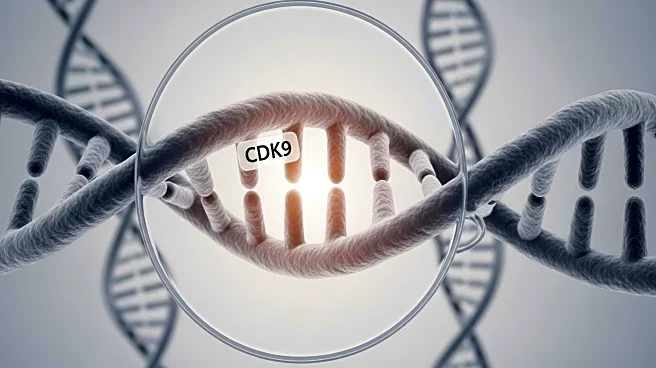What is the story about?
What's Happening?
Recent genetic research has identified novel biallelic variants in the CDK9 gene associated with retinal dystrophy, a condition characterized by progressive vision loss. The study focused on an 11-year-old girl who exhibited symptoms such as bilateral ptosis and retinal degeneration. Genetic analysis revealed two rare missense variants in the CDK9 gene, one inherited from her mother and the other a novel de novo mutation. These findings suggest a potential genetic basis for her condition, which does not include other features typical of CHARGE syndrome. The research highlights the complexity of genetic factors in retinal dystrophy and underscores the importance of genetic testing in diagnosing and understanding rare diseases.
Why It's Important?
The discovery of CDK9 variants linked to retinal dystrophy is significant as it enhances the understanding of genetic contributions to vision disorders. This research could lead to improved diagnostic tools and targeted therapies for individuals with similar genetic profiles. Identifying specific genetic mutations allows for more personalized medical approaches, potentially improving patient outcomes. Furthermore, this study contributes to the broader field of genetic research by providing insights into the mechanisms of gene-related diseases, which could have implications for other conditions beyond retinal dystrophy.
What's Next?
Future research may focus on further characterizing the role of CDK9 variants in retinal dystrophy and exploring potential therapeutic interventions. Genetic counseling and testing could become more prevalent for families with a history of similar conditions, aiding in early diagnosis and management. Additionally, the findings may prompt further studies into the genetic underpinnings of other rare diseases, potentially leading to new discoveries and treatment options.
Beyond the Headlines
The ethical implications of genetic testing and research are significant, particularly concerning privacy and the potential for genetic discrimination. As genetic research advances, it is crucial to address these concerns and ensure that findings are used responsibly to benefit patients without compromising their rights.
















